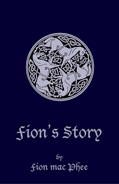 |
Fion's Story by Fion mac Phee (as told to A.E. Hollingsead) Lulu
book review by Peter M. Fitzpatrick
"I explained that I were tuned to horses and that my family raised the ponies and the white stallions that are so desired by a lot of the clans."
Fion unfolds his story like a Celtic knot, over the course of three Harvest fairs, the late July festival of Lughnasadh. Fion meets and is betrothed to his wife in the first, after winning a horse race. He has a baby girl and a pregnant horse by the second, so he can only watch his cousin win the race. By the third Harvest, Fion's father has died, he has a baby boy, and his horse trading business is thriving. He is content to watch his cousin win again, for Fion is transitioning from the young hero-figure of the horse racer to householder and mature businessman. Lughnasadh is, of course, a Druid festival and this is a time in Ireland when Druid ways still vied with the new Christian ideas in a vital manner. Fion's own father is burned in a funeral pyre with Druidic rites, but Fion himself has been married by a priest who combines both religions. This is a time of transition, just like the turning seasons. The largely local and limited world of this agrarian people is just beginning to get a sense of a greater whole, of a national sense. By story's end, the High King's troops arrive to help Fion rescue his wife from a renegade clan who kidnap her for ransom.
The author invokes the rhythms and patterns of ancient Celtic customs by focusing on the agricultural cycles of growing and harvest; storage and saving; and waiting out the winter. The voice of Fion sounds like the country brogue of a rustic from the middle ages of Ireland. With his innate sense of family and clan, Fion's voice also describes that sense of connectedness that would ultimately join the four kingdoms of ancient Ireland into one nation. The old dependence on the cycles of nature—and the vagaries of famine and feast that were attendant upon it—are shown here to be slowly but surely transcended, in the development of trade and business, in a growing cosmopolitanism, and in a unity that naturally implies love and law. Fion helps us celebrate the old; he cannot help but cycle us forward, into the future.
